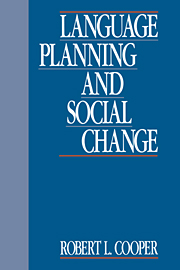Book contents
8 - Social change
Published online by Cambridge University Press: 06 January 2010
Summary
Each example of language planning which appears in this book arose in the midst of social change. With respect to our defining examples, we see that political centralization along with a growing desire for order accompanied the founding of the Académie française; increased persecution of Russian Jews, a growing Jewish nationalist movement, and rising Jewish immigration to Palestine accompanied the renativization of Hebrew; the growing participation of women in the American work force accompanied the feminist campaign against sex-bias in language usage; and a political and economic revolution accompanied the mass literacy campaign in Ethiopia. That social change accompanies language planning is scarcely surprising, inasmuch as language planning, concerned with the management of change, is itself an instance of social change. In a stable world of complete equilibrium, where each day is much like the one before and the one to come, and where all members of society are satisfied with that condition, language planning would be unlikely. Social change, the appearance of new social and cultural patterns of behavior among specific groups within a society or within the society as a whole, has been implicit throughout this book. This final chapter considers social change explicitly.
Sources of social change
What factors produce social change? The most commonly cited factors include the physical environment, population, discovery and invention, cultural diffusion, ideology, and decision-making.
The physical environment. According to Huntington (1924), societies change as geographic conditions change.
- Type
- Chapter
- Information
- Language Planning and Social Change , pp. 164 - 182Publisher: Cambridge University PressPrint publication year: 1990



